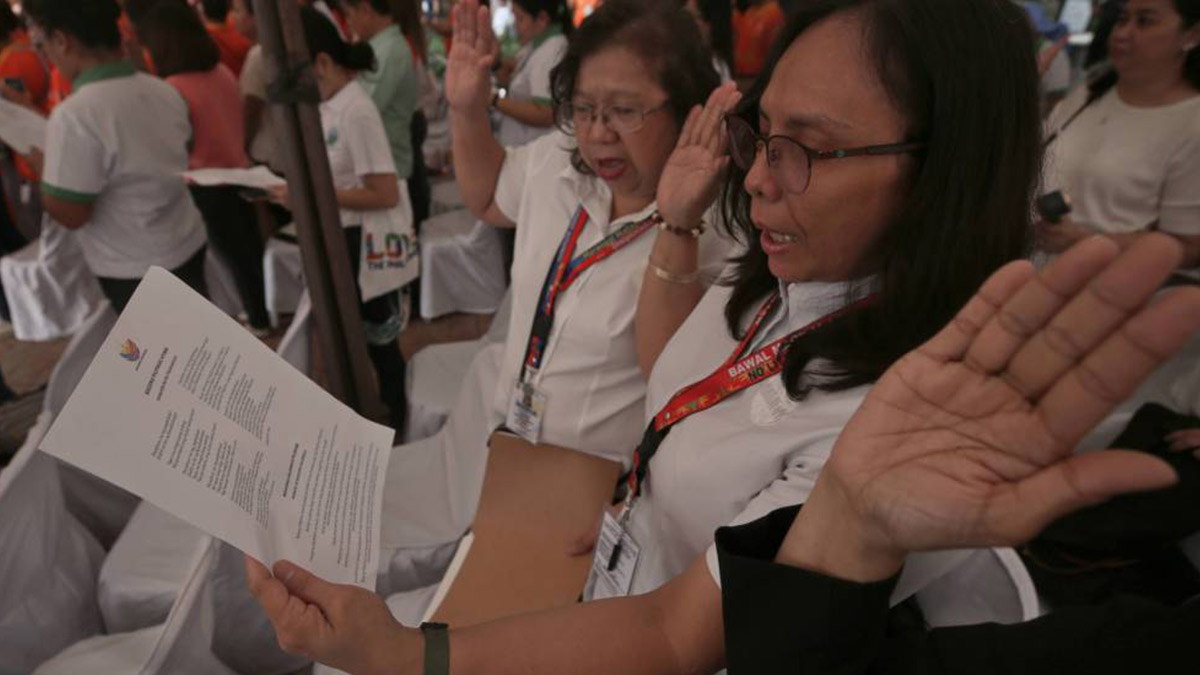
VOW FOR A BETTER COUNTRY Authorities employees recite the “Bagong Pilipinas Pledge” after singing the nationwide anthem through the opening ceremony of “Pampamahalaang Programa at Serbisyo,” a service caravan, at Rizal Park in Manila on Monday as a part of the nation’s 126th Independence Day celebration. —Richard A. Reyes
MANILA, Philippines — The “Bagong Pilipinas” (New Philippines) hymn and pledge, as ordered by President Ferdinand Marcos Jr., are past what is remitted by the Flag Legislation and would solely devour extra time that may in any other case be higher spent holding courses, based on critics, together with a number of academics’ teams.
The Alliance of Involved Academics, the Congress Academics/Educators for Nationalism and Democracy (Contend) and the Academics’ Dignity Coalition (TDC) mentioned they have been opposing Marcos’ order for presidency businesses and public colleges to sing and recite the hymn and pledge that are primarily based on his governance branding.
In an announcement on Monday, Contend questioned the legality of the President’s Memorandum Round No. 52, saying this violates Republic Act No. 8491, or the Flag and Heraldic Code of the Philippines.
READ: Marcos’ order: Use Bagong Pilipinas hymn, pledge in flag ceremonies
The group cited the authorized arguments raised by former Far Jap College regulation college dean Mel Sta. Maria, who mentioned the Flag Legislation didn’t give the Workplace of the President any authority to create or add a hymn or pledge in flag ceremonies.
In his publish on X (previously referred to as Twitter), Sta. Maria mentioned the regulation itself already supplied an oath of allegiance.
For Contend, Marcos’ order is harking back to the “Bagong Lipunan” (New Society) theme through the martial regulation interval of his father’s time.
“The introduction of the Bagong Pilipinas hymn and pledge appears to evoke this darkish chapter in our historical past, glorifying an period that introduced struggling to numerous residents,” the group mentioned.
“It’s crucial that our authorities prioritizes tangible enhancements within the lives of our individuals over superficial adjustments that echo a troubling historical past,” it added.
Time-consuming
Searched for remark, ACT chair Vladimer Quetua defined that flag ceremonies in colleges already take not less than 45 minutes of faculty time within the morning.
Quetua, who teaches at a Quezon Metropolis public college, mentioned academics and college students would sing or recite the opening prayer, the nationwide anthem, the “Panatang Makabayan” (Patriotic Oath), the varsity hymn, the Quezon Metropolis hymn, the Nationwide Capital Area hymn, the “Panunumpa sa Watawat” (Pledge of Allegiance to the Philippine Flag) and the oath for presidency staff.
Typically included on this interval have been messages and reminders from the principal or some other college official who wanted to handle the academics and college students.
“Think about that that is already taking a number of time, what extra with this new coverage from the President?” Quetua mentioned in a telephone interview. “This may also lead academics, and particularly college students, to face for almost an hour on open floor,” he added.
‘Amend Flag Legislation’
Senators had blended reactions to Marcos’ order.
Senate President Francis Escudero mentioned he was not towards Memorandum Round No. 52, however mentioned, “In the event that they actually wish to make this formal, the proper manner is to amend the Flag and Heraldic Code and embrace it.”
Escudero’s father, the late lawmaker and agriculture minister Salvador Escudero III, was the principal creator of the Flag Legislation, which was enacted in 1998.
The Senate chief additionally famous that the order solely utilized to the manager department. “It doesn’t robotically cowl the Senate, the Home of Representatives, the Supreme Court docket and different constitutional commissions,” he mentioned, including that they’re solely mandated to comply with what’s said underneath the Flag Legislation.
Senate Minority Chief Aquilino Pimentel III agreed with Escudero that the memorandum round “isn’t ample. I consider a regulation is required in an effort to authorize that.”
Sen. JV Ejercito mentioned the nationwide anthem and the oaths underneath the Flag Legislation have been “greater than sufficient to instill nationalism and love of nation.” —with a report from Tina G. Santos

